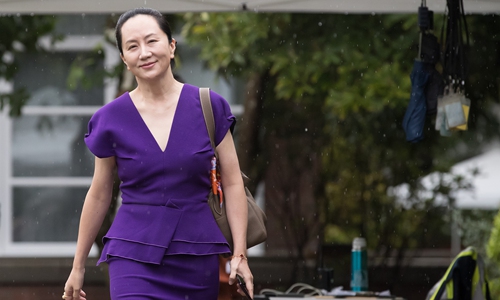HOME >> CHINA
Meng Wanzhou stands trial
By Chen Qingqing Source:Global Times Published: 2020/1/20 22:33:40
Case based on politically motivated false allegations: Chinese experts

Huawei Chief Financial Officer Meng Wanzhou.Photo:VCG
More evidence has emerged that the case against Huawei's chief financial officer is based on groundless allegations, as Meng Wanzhou's extradition trial began Monday (local time) in Vancouver, Canada.
The case was political oppression and needs to be solved through political solutions, Chinese analysts told the Global Times on Monday.
Meng, the daughter of Huawei founder Ren Zhengfei, was set to appear at an extradition hearing at the Supreme Court of British Columbia on Monday, where the first phase of the trial would focus on "double criminality" - a crucial factor to decide whether the extradition to the US would proceed, according to media reports.
Meng was arrested at Vancouver International Airport in December 2018 by Canadian authorities at the request of the US for allegedly violating US law. She faces fraud charges.
In the week-long hearing, Meng's legal team and lawyers for Canada's attorney general will debate the question of double criminality, as her alleged conduct would need to be defined as a crime in Canada before she could be extradited to the US, the reports said.
Evidence obtained by the Global Times in December detailed alleged abuse of law enforcement procedures and violations of law for political purposes by Canadian authorities.
According to the evidence, the Canadian Border Services Agency and Royal Canadian Mounted Police abused its inspection powers to conduct an illegal, covert criminal investigation.
Newer documents support the defense case that Meng did not deceive HSBC. Meng stands accused of making a fraudulent presentation to the bank about the company's business dealing in Iran, the South China Morning Post reported on Friday.
And more documents obtained by the newspaper suggest the bank was aware of the company's business relations years earlier.
HSBC said in an email statement sent the Global Times on Monday that: "We are not a party to this case, so it would be inappropriate for us to comment on any particular evidence. HSBC responded factually to the DOJ [US Department of Justice]'s requests for information. The evidence on which DOJ has relied, including representations made by Huawei to HSBC in 2013, are part of the public record. HSBC was not involved in DOJ's decision-making about what legal theories to pursue."
"A condition for fraud is the other party involved is not aware of the situation, but if HSBC was already aware of it, that won't be a fraud case that violates Canadian law," said Yue Dongxiao, a US-based lawyer who is closely observing the lawsuit.
Reiterating China's position on the case as consistent and clear, the Ministry of Foreign Affairs on Monday urged Canada and the US not to abuse extradition rules and stop coercive measures against Chinese citizens.
"Her case is a severe political plot," Geng Shuang, ministry spokesperson, told a routine press conference in Beijing.
"A political issue needs to be solved through political measures," Fang Xingdong, founder of Beijing-based technology think tank ChinaLabs, told the Global Times on Monday.
If the matter was not properly handled, it would have significant negative impact on China-Canada relations, Fang said, and nobody could win.
China-Canada diplomatic ties and business and trade relations have suffered since Meng's arrest.
De-escalating confrontation between China and the US after the phase one trade deal gives more room for Canada to correct its mistakes, Chinese analysts said.
"If the case can't be properly handled, it will also seriously damage the fundamentals of mutual trust between China and the US in the high-tech sphere, and Chinese entrepreneurs won't feel safe when they do business with US counterparts," Fang said.
RELATED ARTICLES:
Posted in: DIPLOMACY